| Engineering & Technical Wages |
Engineering & Technical Wages
The chemical engineer, with a bachelors degree, is usually paid
very well. While this may be partly because of a broad background in
science and engineering, it also has a lot to do with the type of
industries that employ chemical engineers. About half of today's chemical
engineers work in the petroleum and petrochemical industry. Often
these industries require enormously expensive capital equipment, and
therefor employee salaries becomes a much smaller part of the overall
cost of doing business. Because of this, it makes good sense for these
companies to pay handsomely to get the best person for the job.
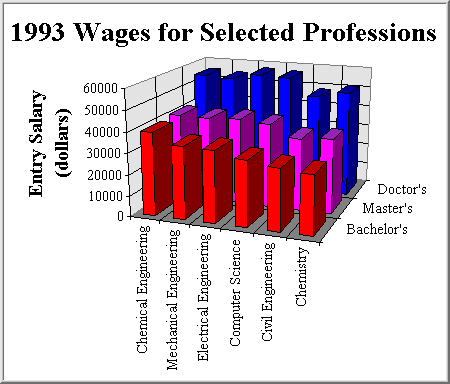
One interesting trend in these wage figures is the relatively low salary
increase chemical engineers receive by acquiring higher degrees. In
some professions, such as chemistry, it makes a lot of financial sense to attain
the highest degree possible. However, this is not necessarily the case for
chemical engineers.
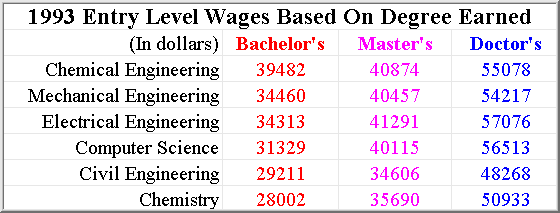
|
1999 Entry Level Wages Based on Degree Earned
|
| |
Bachelor's
|
Master's
|
Doctor's
|
| Chemical Engineering |
$46,900
|
$52,100
|
$67,300
|
| Electrical Engineering |
$45,200
|
$57,200
|
$70,800
|
| Mechanical Engineering |
$43,300
|
$51,900
|
$64,300
|
| Civil Engineering |
$36,100
|
$42,300
|
$58,600
|
|
Note that BS chemical engineers are loosing their
salary advantage (see 1993 data above). Also, BS electrical
engineers now make more than BS mechanical engineers.
|
|
1998 Entry Level Wages Based on Degree Earned
|
| |
Bachelor's
|
Master's
|
Doctor's
|
| Chemistry |
$29,500
|
$38,500
|
$59,300
|
It is also informative to examine the number of degrees awarded to
each of these professions over the last thirty years or so. In the 1980's the
personal computer craze fueled an incredible surge in the number of
computer science degrees. The PC also dramatically increased the number
of electrical engineering graduates. An unrelated, but interesting point,
is the number of chemistry majors which go on to get their Ph.D.
degrees. Chemists undoubtedly are very aware of how their pay scale
is structured and try to take advantage of that insight.
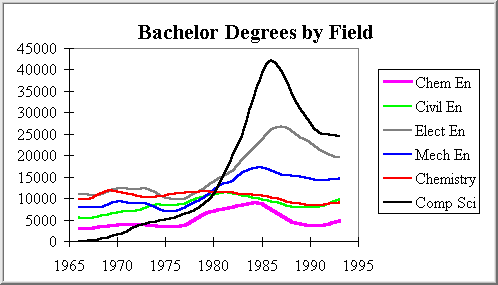
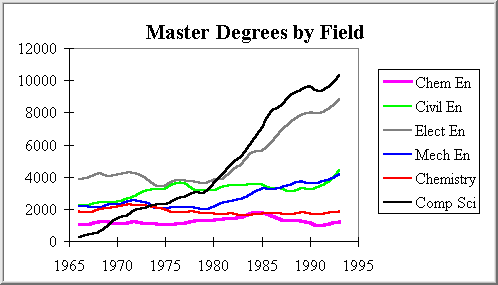
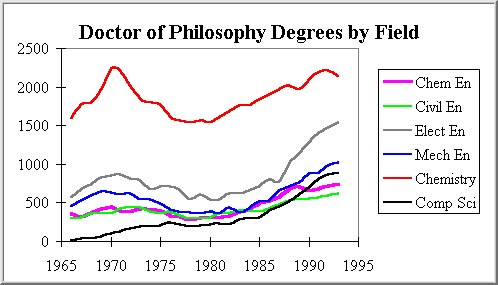
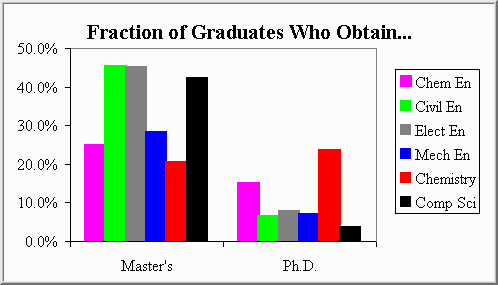
Employment Outlook for Chemical Engineers
"Chemical engineering graduates may face keen competition for jobs as the
number of openings is projected to be substantially lower than the number of
graduates. Employment of chemical engineers is projected to grow as fast as
the average for all occupations though 2008. Although overall employment in
the chemical manufacturing industry is expected to decline, chemical
companies will continue to research and develop new chemicals and more
efficient processes to increase output of existing chemicals. Among
manufacturing industries, specialty chemicals, plastics materials,
pharmaceuticals, and electronics may provide the best opportunities. Much of
the projected growth in employment of chemical engineers, however, will be
in nonmanufacturing industries, especially services industries."
|